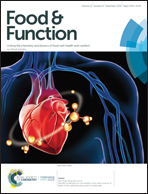Processed Aloe vera gel attenuates non-steroidal anti-inflammatory drug (NSAID)-induced small intestinal injury by enhancing mucin expression
Abstract
Nonsteroidal anti-inflammatory drugs (NSAIDs) are well-known for exerting numerous adverse effects on the gastrointestinal tract such as bleeding, ulceration, and perforation, thereby limiting their use. Most previous studies have focused on NSAID-induced gastropathy. However, improved diagnostic techniques have recently highlighted NSAID-induced small intestinal ulcers, which have so far been underestimated. While proton pump inhibitors are prescribed to control NSAID-induced gastropathy, few preventive strategies are existent for NSAID-induced small intestinal injury, thus requiring new methods to treat these enteropathies. Numerous studies have reported the beneficial biological effects of Aloe vera, such as wound healing, anti-cancer, immune modulation, anti-oxidant, anti-microbial, and gastroprotective effects. A previous report on the effect of Aloe vera against NSAID-induced ulcers studied only gastric ulcers and elucidated the results as an anti-inflammatory effect of Aloe vera. However, ulcer prevention cannot be justified entirely to be due to the anti-inflammatory effects of Aloe vera, since NSAIDs themselves also exert an anti-inflammatory reaction. We therefore investigated the anti-ulcer effects of Aloe vera on the small intestine, especially focusing on mucin expression. Our results indicate that processed Aloe vera gel (PAG) treatment attenuates not only the severity of intestinal ulcers but also bacterial translocation, by enhancing the mucus layer in the indomethacin-induced small intestinal damage mouse model. We further confirmed that PAG positively regulates the mucin expression in the LS174T human cell line, mainly via the ERK-dependent pathway. We propose that PAG application is a potential strategy for the alleviation of NSAID-induced small intestinal ulcers.



 Please wait while we load your content...
Please wait while we load your content...